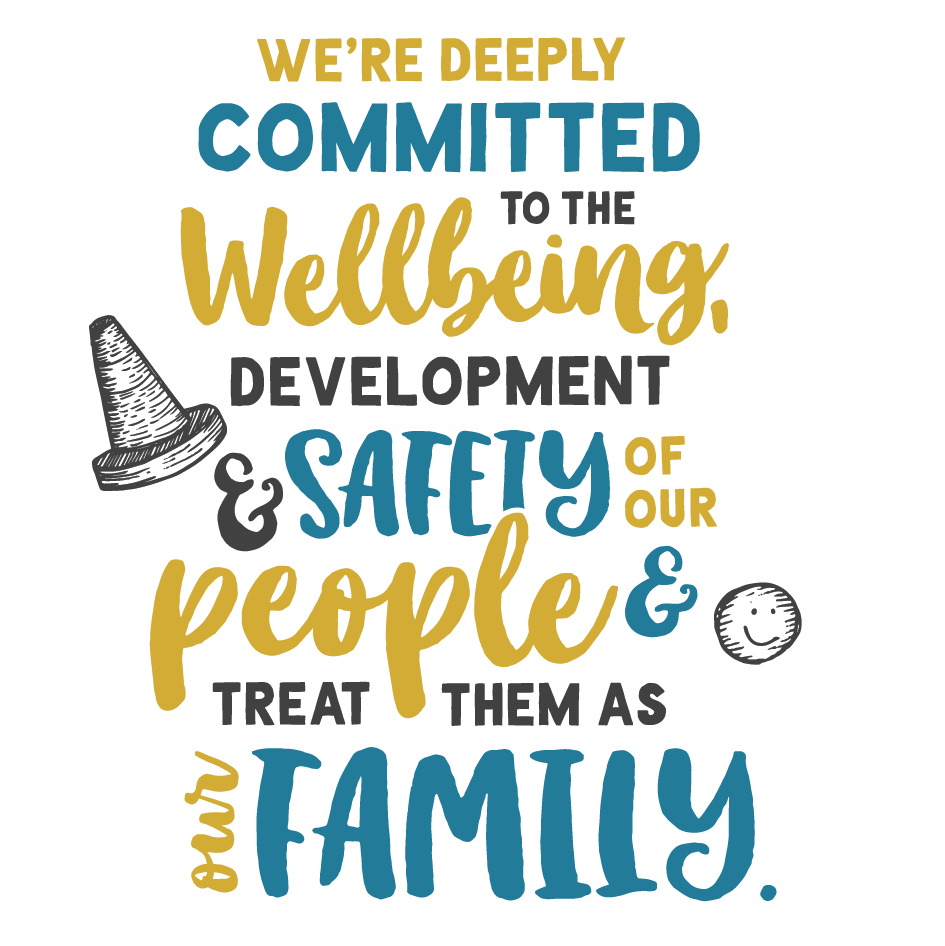

As a leader, you may play an important role in the life of someone who is impacted by Domestic and Family Violence
Your understanding, connection and empathy are key in this confronting situation, and so is your own wellbeing and safety. And so, we have developed a range of resources to help you communicate and organise workplace support to someone who is impacted and resources for you to debrief.
Collins Foods is here to help our people who are impacted by Domestic and Family Violence.
Some insights
Hear the brave stories from people with lived experience of Domestic and Family Violence. These stories may provide you with some insights to guide your response to someone who is impacted by Domestic and Family Violence.
What steps do i need to take?
If you are a leader/manager, work in HR, or one of your employees tells you that they are impacted by Domestic and Family Violence, please follow the next steps:
1. Ensure a private location for the conversation.
2. Ask the person if they are safe and assure them they will be supported by Collins. Allow them to tell you their situation in a way they feel comfortable.
3. Provide them with the process from here, as outlined in the next steps below.
4. If a team member or colleague discloses to you they are impacted by Domestic and Family Violence, it is important that you ask them the right questions to ensure they are safe and to guide them to specialist support services. Ask the person impacted for permission to contact HR as they can provide additional support and undertake a safety assessment.
5. Discuss the options that are available to them in relation to support from Collins ( Domestic and Family Violence policy). These options include 5 days paid Domestic and Family Violence leave each year (pro rata for part-time and casual employees), the use of EAP and emergency financial relief. You then have the discretion to decide whether any additional unpaid leave is necessary, depending on the circumstances of the employee. Please classify the leave as Family Leave in Riteq (for restaurants) and Preceda (for above store/RSC).
Please note: this code needs to be submitted by a Manager or HR.
6. Agree on which of these options is most suitable and a timeframe to undertake these options.
7. If the agreed support includes flexible work arrangements or Domestic and Family Violence leave, please arrange to cover this person’s tasks during this time. Again, please discuss with your HR Representative if you need support with this. Please ensure all enquiries are made confidentially.
8. Ask the person if they need any medical assistance. If they do, please support them to arrange a medical appointment.
9. Let the person know you will be checking in with them regularly to monitor their wellbeing. Agree the regularity and channel for these check-ins. Please do not refer to domestic violence in emails or texts. Instead, keep messages simple, i.e. “I missed catching up with you at work today, could you please call me when you have a moment?” – do not allude to the fact the staff member was not at work. And when you call them, ask “Is now a good time to speak?” Before starting the conversation. Reiterate that the lines of communication are always open and each time you speak with them, ensure they are comfortable with the ongoing check-ins and the method to do so.
10. Ensure all communications about this matter are confidential between you, the person and HR.
11. Domestic and Family Violence is a confronting topic. If you are struggling to support someone who is impacted, please talk to HR Enquiries for support or reach out to Access EAP on 1800 81 87 28.
More information is available in our Leader Guide.
Assistance for managers and leaders
How do I support someone who is impacted by Domestic and Family Violence?
If someone opens up to you and tells you they are impacted by Domestic and Family Violence, it will be a very difficult conversation for them – they are likely to feel embarrassed and uncomfortable.
Check out this video for more great tips and advice.
We ask you to follow this advice when talking with them:
Understand the gravity of the situation – the impacts of Domestic and Family Violence are significant and can have long term effects across a person’s life. These effects may lead to changes in their world. So please recognise these impacts in your conversations.
Find a discreet location for the conversation and assure them of confidentiality. Take them for a walk around the restaurant or have a chat in an area where others can’t listen into the conversation.
Be gentle – this is a very tough situation for the person who is impacted.
Be attentive – give them your full attention.
Believe them – often people don’t come forward to talk about Domestic and Family Violence for fear they will not be believed. Your faith in them is important.
If you suspect someone is impacted by Domestic and Family Violence, start the conversation in a gentle and general manner, that will give them the choice to share their situation with you if they want to. A good question to begin with is, “I’ve noticed you seem a bit different lately – are you OK?”
If someone opens up to you about being impacted by Domestic and Family Violence, their safety and wellbeing are paramount. Please ask “Are you safe?”
It is important that the person who is impacted by Domestic and Family Violence is empowered to seek the type and amount of support they need. So, ask them general questions that enable them to decide how they are supported “How can I help?” Or “what do you need from me?” And then respect the person to make their own decisions.
Let them know the process from here and ask their permission to invite HR into the conversation.
Don’t try to be a counsellor or tell them what to do – please refer them to specialist providers such as 1800 RESPECT.
Please refrain from judging them about their situation.
Ask if they need support with their workload and then create an action plan if they need to adjust their duties for a period whilst they navigate their Domestic and Family Violence situation.
Organise regular check-ins to make sure you can support them on an ongoing basis and monitor any changes to their situation. Check you have their correct contact details to ensure you can reach them for these check-ins, and ask them the best and safest way to make contact.
What not to say
A person who is impacted by Domestic and Family Violence may feel confronted, vulnerable, and fearful.
It is important to follow these principles when having a conversation:
-
- Avoid any questions that may blame the person, for example:
“Why do you stay with a person like that?”
“What could you have done to avoid the situation?”
“Why did you let them hit you?” - Be mindful to let them tell you as much as they are comfortable sharing – do not ask in-depth questions.
- Avoid labelling and judgement, as this may make the person feel worse.
- Avoid any questions that may blame the person, for example:
Safety Planning
This plan may include:
-
- A list of emergency numbers
- A safe place to go
- A safe place to store items such as valuables, cash, keys and important documents
- Identifying friends and family support
For more information please visit www.1800respect.org.au
If you need to talk to someone
We understand that it can be confronting and difficult to support someone who is impacted by Domestic and Family Violence, and we want to support you during this time.
Our EAP provider AccessEAP is available 24/7 on 1800 818 728 or book an appointment online for free and confidential advice or for you to talk about the situation.
You can also contact 1800 RESPECT – www.1800respect.org.au. These specialist counsellors also provide support and guidance.
Roles & responsibilities
As a manager at Collins Foods, your responsibilities in relation to Domestic and Family Violence are:
-
model our Collins Foods values of People at the Heart and promote a work environment free from any form of violence
-
don’t take any actions that puts yourself at risk
-
read through the content of this website to learn more about Domestic and Family Violence
-
encourage your team to read through the content of this website to learn more about Domestic and Family Violence
-
sensitively communicate with employees affected by Domestic and Family Violence and keep any information confidential. Visit Supporting someone who is impacted by Domestic and Family Violence
-
take immediate and appropriate action to address any reports of employees affected by Domestic and Family Violence
-
ensure appropriate management of work performance and monitoring of attendance issues
-
provide feedback to your leadership team ad HR to report issues with or opportunities to improve our approach to Domestic and Family Violence
-
identify and report any workplace factors that pose a risk from a safety and well-being perspective
Be an everyday advocate
A part of our response to Domestic and Family Violence is ensuring our leaders model respectful behaviour and lead the way in the stand against Domestic and Family Violence. This includes:
Be aware and know the facts – take time to understand Domestic and Family Violence, the impacts, warning signs and how to have a conversation with someone who is impacted. This will enable you to take an informed and compassionate approach to someone who is impacted.
Shift the focus and avoid victim-blaming – avoid speaking to someone who is impacted by Domestic and Family Violence as if they are to blame for the situation. This includes avoiding questions like “why didn’t you leave?”. It is important to park any judgement about their situation or choices as this may make them feel worse.
Words matter – consider the things you say, and avoid language that may threaten or condone aggressive behaviour.
Speak up and discourage abusive behaviours – if you hear someone behaving inappropriately, either call it out and let them know you don’t like the way they are speaking or report the matter to your HR business partner.
Avoid stereotypes – Domestic and Family Violence can happen to anyone – it does not discriminate.
Maintain healthy boundaries
Please maintain healthy boundaries as follows:
-
- Avoid situations that may put you at risk
- Lean in with empathy, rather than rescuing a person who is impacted. This may mean being there for a confidential and compassionate conversation or guiding them to specialist support services such as 1800 RESPECT – www.1800 respect.org.au
- Reach out for support if you are struggling via our EAP partner AccessEAP for free and confidential advice.
They can be contacted 24/7 on 1800 818 728 or book an appointment online.
How can Collins Foods help?
At Collins, our People are at the Heart of what we do, and we are deeply committed to their wellbeing and safety. We like to think of the Collins Team as our extended Family.
To support our wider team, we’ve created a Domestic and Family Violence Leader Guide can receive the support they need.
Collins Foods offers a range of support for people who are impacted by Domestic and Family Violence.
Paid leave
5 days paid domestic and family violence leave (pro-rata for part-time and casual employees). This can be used to relocate, attend appointments, or seek support from specialist services.
Financial Support
$5,000 one-off grant provided through Collins Family Fund. These funds can be used for day-to-day expenses, including groceries, rent or fuel. Applications can be made in the strictest confidence.
Counselling
Free and confidential support through EAP counselling.
Visit AccessEAP or contact them on 1800 818 728 or book an appointment online.
Further assistance
Learn more about help available in our DFV policy or contact our HR team. If someone requests assistance, please suggest they contact HR to develop a workable approach to their specific situation.
Our Commitment
To support and educate the Collins Family team about Family and Domestic Violence.

What is family and domestic violence?

I am impacted by family and domestic violence

I am supporting someone who is affected by violence

I am a leader or manager wanting to learn more
People at the heart
If you need support in relation to Domestic and Family Violence, either for yourself or one of your team, please reach out to HR Enquiries.
Please refer to our Domestic and Family Violence policy or DFV Leader Guide for further information.



